
Empress Matilda, also known as Empress Maud, was one of the claimants to the English throne during the civil war known as the Anarchy. The daughter and heir of Henry I, king of England and ruler of Normandy, she went to Germany as a child when she was married to the future Holy Roman Emperor Henry V. She travelled with the emperor to Italy in 1116, was controversially crowned empress in St Peter's Basilica, and acted as the imperial regent in Italy. Matilda and Henry V had no children, and when he died in 1125, the imperial crown was claimed by his rival Lothair of Supplinburg.
Matilda was suo jure Countess of Boulogne from 1125 and Queen of England from the accession of her husband, Stephen, in 1135 until her death in 1152. She supported Stephen in his struggle for the English throne against their mutual cousin Empress Matilda. She played an unusually active role for a woman of the period when her husband was captured, and proved herself an effective general who managed to force the Empress to release Stephen. Under the agreement that settled the civil war, the Queen's children did not inherit the English throne but her three surviving children ruled Boulogne in turn as Eustace IV, William I, and Marie I.

Matilda of Scotland, also known as Good Queen Maud, was Queen of England and Duchess of Normandy as the first wife of King Henry I. She acted as regent of England on several occasions during Henry's absences: in 1104, 1107, 1108, and 1111.
William FitzEmpress or William Longespee was the youngest of the three sons of Empress Matilda and Geoffrey Plantagenet, Count of Anjou. His brothers were Henry II of England and Geoffrey, Count of Nantes.
Felicity Pulman is an Australian author with an interest in crime, history and fantasy. Her novels include Ghost Boy, the Shalott trilogy and A Ring Through, as well as her medieval young adult crime series The Janna Mysteries. Pulman has also penned articles on writing and the creative process. She has presented and given talks at schools, conferences and writers festivals.
King Stephen of England was a grandson of William the Conqueror, and has been depicted in various cultural works. He was King of England from 1135 to his death, and also the Count of Boulogne jure uxoris. His reign was marked by a civil war with his cousin and rival the Empress Matilda, in a period called the Anarchy which has been dramatized by Beth Flintoff in her play Matilda the Empress, first performed in November 2017 at St James's Church, Reading. Stephen was succeeded by Matilda's son, Henry II, the first of the Angevin kings.

The Rose Rent is a medieval mystery novel set in the summer of 1142 by Ellis Peters. This is the thirteenth novel in The Cadfael Chronicles, first published in 1986.

One Corpse Too Many is a medieval mystery novel set in the summer of 1138 by Ellis Peters. It is the second novel in the Cadfael Chronicles, first published in 1979.

Dead Man's Ransom is a medieval mystery novel by Ellis Peters, first of four novels set in the disruptive year of 1141. It is the ninth in the Cadfael Chronicles, and was first published in 1984.
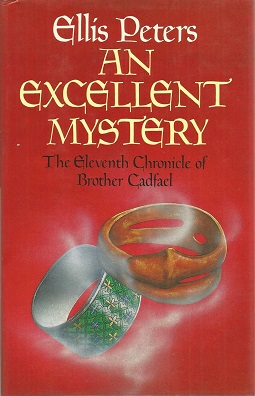
An Excellent Mystery is a mystery novel by Ellis Peters, the third of four set in the year 1141, when so much occurred in the period known as the Anarchy. It is the 11th in the Cadfael Chronicles, published in 1985.
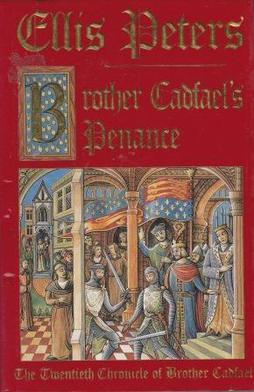
Brother Cadfael's Penance is a medieval mystery novel set in the autumn of 1145 by Ellis Peters. It is the last novel in the Cadfael Chronicles, first published in 1994.

Saint Peter's Fair is a medieval mystery novel by Ellis Peters, set in July – September 1139. It is the fourth novel in The Cadfael Chronicles, first published in 1981. The story occurs during The Anarchy, in the English town of Shrewsbury.
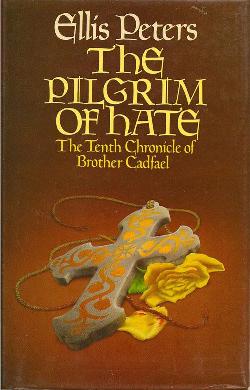
The Pilgrim of Hate is a medieval mystery novel by Ellis Peters, set in spring 1141. It is the tenth in the Cadfael Chronicles, and was first published in 1984.

The Confession of Brother Haluin is a medieval mystery novel set in the winter of 1142–1143 by Ellis Peters. It is the fifteenth novel in the Cadfael Chronicles, and was first published in 1988.
The Cadfael Chronicles is a series of historical murder mysteries written by the linguist-scholar Edith Pargeter (1913–1995) under the name Ellis Peters. Set in the 12th century in England during the Anarchy, the novels focus on a Welsh Benedictine monk, Cadfael, who aids the law by investigating and solving murders.
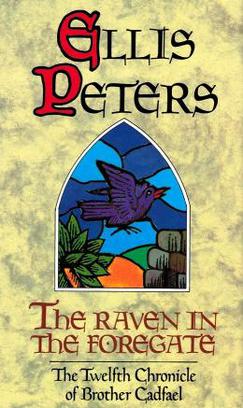
The Raven in the Foregate is a medieval mystery novel by Ellis Peters, fourth of the novels set in 1141, a year of great political tumult in the Anarchy. It is 12th of The Cadfael Chronicles, and first published in 1986.
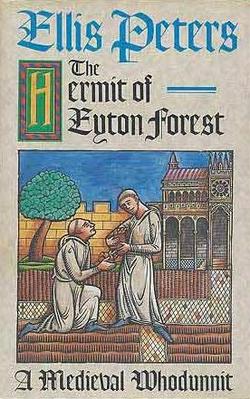
The Hermit of Eyton Forest is a medieval mystery novel by Ellis Peters, set in the autumn of 1142. It is the 14th novel in the Cadfael Chronicles and was first published in 1987.

The Heretic's Apprentice is a medieval mystery novel by Ellis Peters set in June 1143. It is the 16th novel in the Cadfael Chronicles and was first published in 1989.

The Potter's Field is a medieval mystery novel by Ellis Peters set in August to December 1143. It is the 17th volume of the Cadfael Chronicles and was first published in 1989.
William Paynel was an Anglo-Norman nobleman and baron. Son of a Domesday landholder, William inherited his father's lands in Yorkshire, Lincolnshire, and Normandy after the death of an older brother during their father's lifetime. After the death of King Henry I of England, Paynel supported Henry's daughter Matilda in her attempts to take the throne from her cousin Stephen, who had seized it. Matilda entrusted Nottingham Castle to Paynel's custody, although he lost it within two years when it was captured by a supporter of Stephen's. Paynel also founded two religious houses - one in England and one in Normandy. After Paynel's death around 1146, his lands were split between two sons.













